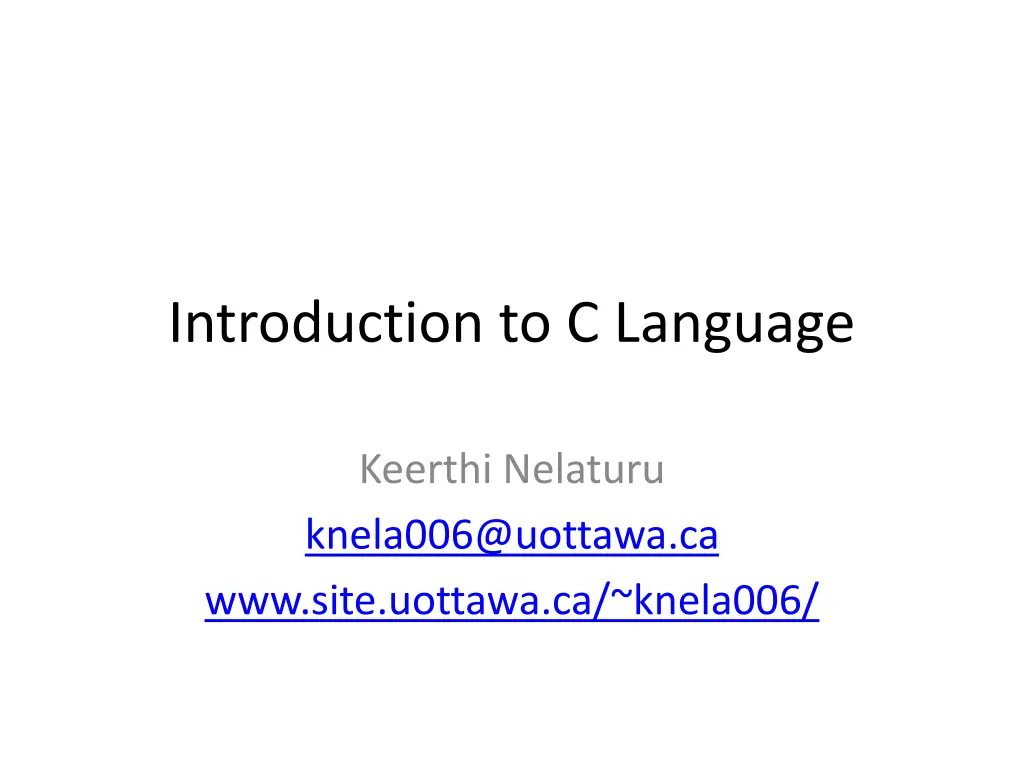
Insights into C Language and Programming Fundamentals
Gain insights into the C programming language with a quick introduction, basic syntax, variables, keywords, data types, compiling and running programs, input/output functions, and format specifiers. Explore the foundational concepts of C programming for beginners.
Download Presentation

Please find below an Image/Link to download the presentation.
The content on the website is provided AS IS for your information and personal use only. It may not be sold, licensed, or shared on other websites without obtaining consent from the author. If you encounter any issues during the download, it is possible that the publisher has removed the file from their server.
You are allowed to download the files provided on this website for personal or commercial use, subject to the condition that they are used lawfully. All files are the property of their respective owners.
The content on the website is provided AS IS for your information and personal use only. It may not be sold, licensed, or shared on other websites without obtaining consent from the author.
E N D
Presentation Transcript
Introduction to C Language Keerthi Nelaturu knela006@uottawa.ca www.site.uottawa.ca/~knela006/
Quick inside into the language Closely associated with UNIX system System programming language Stemmed up from Language BCPL Supports data types, functions, control flow statements etc.
First C Program Print Hello, world #include <stdio.h> main() { printf( hello, world \n ); }
More escape sequences \n Newline character \t Tab \b Backspace \ Double quote \\ - Backslash
Comments in C They start with /* and end with */ . Ignored by the compiler C compilers do not care about how a program looks, indentation and spacing. Documentation of your program is always important! Makes it easy for people to read through.
Variables in C Must be declared before they are used C language is Case Sensitive Cannot use keywords for variable names Declaration of variable consists of : Type name List of variable names Terminator (;) Ex: int fahr, celsius; float lower, upper, step;
Basic data types in C int float char short long double
Compiling and Running a C program In Unix, Command to compile: gcc hello.c Running a executable file ./a.out
Input/Output Printf is the basic output function we use for displaying content in C Syntax: printf( %d %6.2f , intvar1, floatvar2); Scanf is the function we use to get user input. Syntax: scanf( %d%f ,&test1,&test2);
Operators Arithmetic Operator : +, -, *, /, % Assignment Operators: +=, -= etc Relational and Logical Operators: >, >=, <, <=, ==, !=, &&, || Always check for the order of precedence when evaluating an expression with operators in it. Type conversions: From narrower to wider. int to float Correct float to int wrong Check the texbook for table on precedence of all operators.
Increment / Decrement Operators Increment : ++ (post & pre) Decrement: -- (post & pre) Ex: n++ - will increments n after the value is used ++n will increment n before the value is used Increment and Decrement operators can only be applied to variables not expressions
Bitwise Operators Six operators for bit manipulation in C & - bitwise AND | - bitwise inclusive OR ^ - bitwise exclusive OR << - left shift >> - right shift ~ - one s complement (unary) Conditional Expression: exp1 ? Exp2 : exp3;
Constants #define MAXLINE 1000 char esc = \\`; int i = 0; int limit = MAXLINE +1; float aFloat = 1.0e-5; const double e = 2.7856;
Control Flow Else if If-Else Switch switch (expression) { case const-expr: statement default: statements break; }
Control Flow (contd) do-while while For Goto! for ( ) { if (disaster) goto error; } error: printf( bad programming! );
